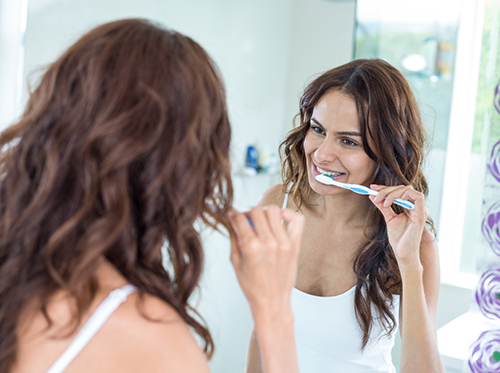September 30th, 2020

You make sure your daughter wears her mouthguard to every soccer practice. Your son doesn’t step on the basketball court without his. Why not protect your smile as well?
Athletes of all ages in team or recreational sports can help prevent dental injuries with a protective mouthguard. If you bike or ski, play racquetball or squash, skate, or sky dive, a mouthguard will help keep your teeth and gums healthy as you keep fit.
Mouthguard Options
Our office will be happy to talk to you about whether a mouthguard is a practical addition to your workout gear. There are many options available to you, including:
Stock: Preformed appliances available at sporting goods stores and drugstores. These are the most affordable, but are a one-size-fits-all option and may not be a comfortable fit for you.
Boil-and-Bite: Also available at sports shops and drugstores. This guard is formed by placing it in hot water and then biting down to allow it to conform to the shape of your mouth.
Custom: Our Detroit office can create a personalized mouthguard just for you. Individual mouthguards are the most durable and comfortable option, in general, and provide the best fit for ease of talking and breathing while exercising. You may also have special dental conditions, such as the placement of crowns or braces, which could be a factor in your decision.
Whichever option you choose, remember to wear your mouthguard regularly while exercising. A proper mouthguard cannot only help prevent injuries to your teeth, but to your face and jaw as well. A healthy smile and a healthy body are a winning combination. The next time you visit Dr. Aisha Akpabio, let’s talk sports!
September 23rd, 2020

The earliest sign of gum disease is called gingivitis (sometimes called periodontal disease), and is an inflammation of the gums. If left untreated, gingivitis can lead to gum tissue loss, loss of bone that supports the teeth, and eventually tooth loss. The good news is that gingivitis is easily treatable at Diamond Smiles Dentistry. Better yet, gingivitis is nearly 100 percent preventable.
Gingivitis is usually caused when plaque and bacteria accumulate on the gums, generally due to poor oral hygiene. A patient with gingivitis will have red and puffy gums that will likely bleed when he or she brushes or flosses.
It is almost entirely within our patients’ power to prevent gingivitis by brushing and flossing on a daily basis. In addition to good oral health habits, regular visits to see Dr. Aisha Akpabio will also help with early detection. We can often detect minor inflammation and other signs of gingivitis before it causes any discomfort or issues.
If left untreated, gingivitis will eventually progress to periodontitis, a breakdown of the tissue and bone that support the teeth. Smokers, women who are pregnant or menopausal, people with heart disease, diabetes, epilepsy or HIV infection, and people who suffer from poor nutrition are more likely to have gum disease.
To learn more about gingivitis, or if you suspect you have gingivitis, we encourage you to give us a call at our Detroit office today!
September 16th, 2020

A lot of patients go at their teeth like they were sanding an old floor—that is to say, way too hard! Brushing too hard is probably the most common mistake patients make in their oral care routine, and it can be detrimental to the gums and teeth.
What can brushing too hard cause?
- Receding gums
- Bone loss around teeth
- Loss of teeth
- Tooth sensitivity, especially to hot and cold
- Worn down enamel
Brushing too hard wears away at your gums, which can lead to the neck of the teeth being exposed. This part of the tooth isn't covered by hard enamel like the rest of the tooth and hence the soft inner layer, or dentin, is exposed. Dentin is very sensitive to hot and cold and much more susceptible to bacterial decay. Once the gums recede due to improper brushing, it’s usually irreversible.
How to brush your teeth properly
You know you're supposed to brush your teeth twice a day, so why not do it right? First and foremost, you should only ever brush with a soft bristled brush—not medium or hard—unless directed otherwise by Dr. Aisha Akpabio. Unless you have braces or specific oral health issues, brushing twice a day for two minutes is usually plenty.
The main purpose of brushing is to remove plaque from your teeth and gums. Plaque is actually soft and is a buildup of bacteria, saliva, and food debris. You really don't need to brush hard to remove it, just make sure you aim your toothbrush at the gum line (where plaque grows) and brush in small circular motions, never a back-and-forth motion.
It's also wise to hold your toothbrush gently. People tend to brush harder the tighter they hold their toothbrush.
Still have questions about proper tooth brushing technique or gum health? Ask any staff member or Dr. Aisha Akpabio during your next visit to our Detroit office; we'd be happy to help!
September 9th, 2020

What do we know about osteoporosis? We may know that this disease makes the bones more brittle and vulnerable. We may know that osteoporosis is the cause of many a broken hip or curved spine as we age. We may even know that, for a number of reasons, women are far more likely to develop this disease. What we may not be aware of is the impact osteoporosis can have on our dental health.
“Osteoporosis” means “porous bones.” It is a disease that makes the bones more likely to fracture or break, as the body’s careful balance of absorbing old bone tissue and replacing it with new healthy bone tissue is disrupted. We lose bone tissue faster than we can create new, dense bone tissue. Why is this important for our dental health? Because the fitness of our teeth depends on the fitness of the bones surrounding and securing them in our jaws.
How does osteoporosis affect dental health?
- Osteoporosis reduces density in the bones and bone tissue that hold our teeth in place. Studies have shown that women with osteoporosis have significantly more tooth loss than women without the disease.
- Periodontitis, or gum disease, can also cause deterioration in the bone surrounding the teeth. This is a time to be proactive with gum health to avoid infections and further bone loss.
- Denture wearers may find that their dentures no longer fit properly due to changes in bone structure. Bone loss needs to be addressed promptly to avoid having to replace dentures.
- Rarely, bone-strengthening medications for osteoporosis can lead to serious jaw problems after dental procedures that involve the jawbone (such as extractions). Always tell us any medications you are taking before we schedule any dental treatment.
Unfortunately, osteoporosis often has no symptoms at all—until the first bone fracture. Checking our bone density is important as we age, and one way of discovering changes in bone density is through your regular dental checkups at our Detroit office. We can pinpoint changes in your X-rays through the years and will recommend that you see your physician if there is any indication of bone loss. If you have already been diagnosed with the disease, we have ideas to help maintain the health of your teeth and bones.
Many factors can increase your chance of developing osteoporosis. Age, illness, personal habits, medications, diet, genetics—any number of conditions can affect our bone health. Talk to us about osteoporosis. Dr. Aisha Akpabio would like to work with you to provide prevention and treatment to keep your teeth and bones strong and healthy for a lifetime of beautiful smiles. And that’s certainly good to know!





 Website Powered by Sesame 24-7™
Website Powered by Sesame 24-7™